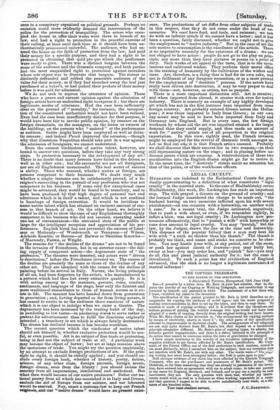THE COPYING TELEGRAPH.
TO THE EDITOR OF THE SPECTATOR.
6 Haverstock Terrace, Hampstead, 13th June 1848 Sin—I perceive by a letter from Mr. Bain in your last number, that he dis- putes the novelty of my Copying or Writing Telegraph, and asserts that it was invented by himself, and patented in 1843. The statement of a few facts will, I trust, establish my claim to the invention. The specification of the patent granted to Mr. Bain in 1843 describes an ar- rangement for copying the surfaces of metal types; and the mode proposed of making communications is, first to set up the types, and then to copy them. No mention is made of copying writing; and it is evident that the circuitous and tedious process of putting the written message into type would not have been adopted if a mode of copying directly from the original writing had been known. What Mr. Bain claims as his invention is, "the arrangement for copying surfaces by means of electricity, shown in sheet 6 "- the other parts of the specification referred to improvements in electrical clocks. The arrangements of my telegraph are not only quite distinct from Mr. Bain's, but they depend on a mechanical principle altogether different. Mr. Bain's plan of copying types, he admits, has hitherto proved impracticable; and there is a defect inherent in the principle of its action that cannot be overcome unless the laws of gravitation be changed.
I have ample testimony to the novelty of my invention independently of the negative evidence in my favour afforded by Mr. Bain's specification. Mr. Carp- mael, of the Patent Office, one of the first authorities in such matters, stated to me most distinctly, when I consulted him on the subject, that my invention does not interfere with Mr. Bain's, nor with any other. The words were—" ink writing has never been attempted before: the field is quite open to you."
Still stronger evidence of my claim has been afforded by the Electric 'Telegraph Company, who are the purchasers and possessors of Mr. Bain's patent. The Directors, so far from conceiving that they are already in possession of the inven- tion, have entered into an agreement with me to adopt mine; to take out patents in my name for England, Scotland, and Ireland, and to pay me a royalty on each instrument they use. The only question with them was, whether my instru- ments would work as well at a distance as when working separately in a room; and that question I expect to be able to solve satisfactorily next week, at a dis- tance of one hundred miles.
























 Previous page
Previous page